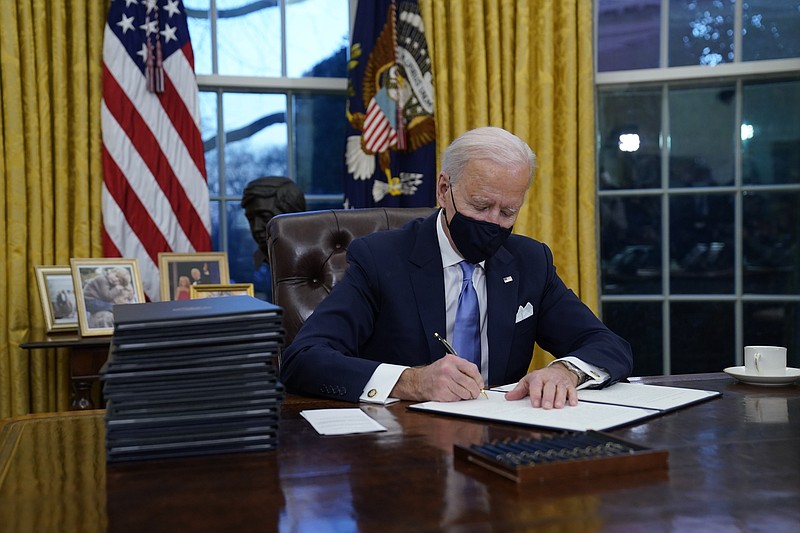WASHINGTON -- President Joe Biden on Thursday appointed Rebecca Kelly Slaughter as acting chairwoman of the Federal Trade Commission, a move that positions the Washington watchdog agency to take on a more aggressive role in policing Facebook, Google and other big technology companies in Silicon Valley.
Biden also designated Jessica Rosenworcel as acting chairwoman of the Federal Communications Commission. Rosenworcel is a fervent supporter of neutrality rules requiring internet providers to treat all web traffic equally and for years has called on the FCC to put its muscle behind a gigantic effort to build out broadband to the country's most unserved communities.
The two appointments reflect the tectonic political shift underway in Washington as Democrats, newly in charge of the White House and Congress, prepare to roll back a slew of deregulatory actions implemented under President Donald Trump.
But Slaughter and Rosenworcel may face early obstacles at the commission. New vacancies at the FTC and FCC may leave it deadlocked at two Democrats and two Republicans. The stalemate would not totally trap the agencies in policy paralysis, but it still may set back some of their most ambitious plans until Biden nominates additional Democrats and the party's razor-thin majority in the Senate can confirm them.
Slaughter takes the reins at the FTC after serving as a Democratic commissioner since 2018. She stands to inherit an agency that in recent years has issued record-breaking penalties against tech companies for jeopardizing their users' privacy -- and that last month sued Facebook on accusations that it violated federal antitrust laws.
In those and other cases, Slaughter has supported enforcement even as she has joined the FTC's fiercest critics in saying the commission should have acted more swiftly and decisively to penalize the tech industry for its missteps. She has called on the agency to calibrate its punishments better so that harmed web users are made whole and companies in Silicon Valley are deterred from committing similar acts in the future.
"The threats to consumer privacy are growing. They impact our most vulnerable citizens more than most, and they demand new solutions," Slaughter said in a September 2019 speech that illustrated her views about the agency's responsibility to penalize wrongdoers. "My hope is that the 'near future' brings renewed action on this front across the board, from the FTC, Congress, advocates and industry, and I feel both humbled and privileged to get to take part in this effort."
"She is firmly of the belief there are things the FTC should do today that it is not doing today and some of their weakness is self-imposed weakness," said Justin Brookman, director for consumer privacy and technology policy at Consumer Reports.
ROSENWORCEL BROADBAND PUSH
Rosenworcel, who has served as a Democratic commissioner at the FCC for the past eight years, assumes the reins at the telecom agency at a moment when the U.S. government is under immense pressure to ensure all Americans have quality internet access amid the coronavirus pandemic, which has forced families to work and learn from home for nearly a year.
She has been most vocal about the persistent harm wrought by the "homework gap," or the disparity that leaves millions of students nationwide lacking the broadband connectivity required to complete their classwork on time.
"If you want evidence this is not right, it's all around us," Rosenworcel said in a statement this month. "There are people sitting in parking lots using free Wi-Fi signals because they have no other way to get online. There are students who fall in the homework gap because they lack the high-speed service they need to participate in remote learning."
To start, Rosenworcel must take over agency work to implement a new pandemic stimulus program authorized by Congress that would provide rebates to Americans struggling to afford internet service.
Even with the FCC in deadlock, experts said they also expect Rosenworcel to try to release billions of dollars to help students obtain access to Wi-Fi hot spots and other technologies needed to get online. The FCC under just-departed GOP Chairman Ajit Pai ruled that this pot of money, known as E-Rate, is meant only for classroom use -- a position many Democrats oppose at a time when children are still learning from home.
"She firmly believes E-Rate funding should, and can, be used to provide home connectivity for students for distance learning," said Greg Guice, director of government affairs for Public Knowledge.
Rosenworcel also will face early pressure to try to reinstate net neutrality protections. Pai eliminated those rules over the objections of Democrats like Rosenworcel, who said at the time the agency had "failed the American public."

